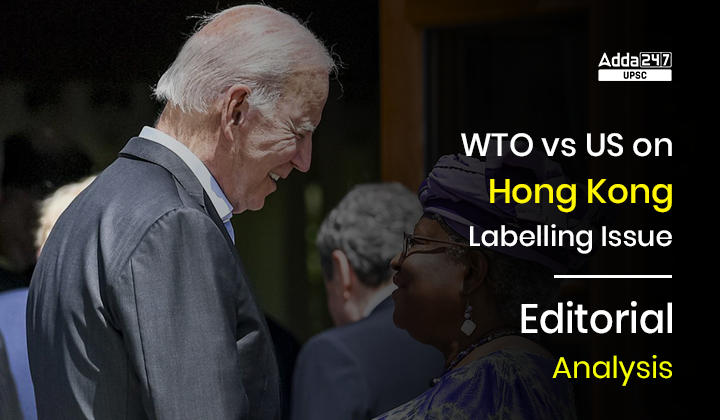Table of Contents
Relevance of Today’s Editorial for UPSC
Today’s Editorial ”WTO vs U.S. on Hong Kong Labelling Issue” is related to International Trade Disputes and Existing Dispute Resolution Mechanism with the World Trade Organization(WTO). It covers GS 3: Bilateral, regional and global groupings and agreements involving India and/or affecting India’s interests.
Analysis Of DTE Magazine: WTO and Global Food Crisis
What is the Issue?
- Recently the 3 member panel of the World Trade Organization has ruled that ‘’The United States is flouting international trade rules by labelling imports from Hong Kong as those from China.’’
- WTO panel found that the US violated an obligation towards Hong Kong by giving it less favourable treatment than other WTO members in terms of marks of origin on its products.
- The Panel said that the US is acting inconsistently with the most-favored-nation treatment requirement in respect to origin marking under the 1994 General Agreement on Tariffs and Trade.
WTO Reforms: 60 Nations back New Method on Food Subsidies
What is the Background of Hong Kong Labelling Issue
- Since Nov 10, 2020, the US has required that all products exported from Hong Kong to the US no longer be marked as originating in “Hong Kong”, but must be marked “Made in China” instead.
- Following a swift and robust objection from the Hong Kong SAR’s government, the WTO’s Dispute Settlement Body agreed in February last year to establish a panel to handle the dispute.
WTO and India: India Invokes Peace Clause of WTO for Third Time
What was Trump’s Decision in 2020?
Trump made the decision – which meant goods made in the Hong Kong city could no longer be stamped “Made in Hong Kong” – after Beijing imposed a sweeping security law on the financial hub in 2020 to stamp out dissent.
What was USs Stand on Hong Kong Before 2020?
- Until 2020, the US had treated Hong Kong, which is semi-autonomous and a separate WTO member, in the same manner as before it passed from British control in July 1997.
Responses of Related Parties on WTO Panel Ruling
USA’s Response
- The US argued that it was just responding to China’s “highly concerning actions”, threatening US national security interests.
- It also said that issues of national security cannot be reviewed in WTO dispute settlement, and the WTO has no authority to second-guess the ability of a WTO Member to respond to what it considers a threat.
Hong Kong’s Response
- Hong Kong praised the WTO ruling and called on Washington to reverse course.
- It said the finding, made by an expert panel of the global trade group’s Dispute Settlement Body, is fair and just and safeguards the Hong Kong Special Administrative Region’s status as a separate customs territory.
What is the Basis of USAs national security defence under GATT?
- The U.S. often justify its tariff hikes and other illegal actions under Article XXI of GATT which allows countries to deviate from their trade obligations on grounds of national security.
- Specifically, Article XXI(b)(iii) of GATT allows a country to take any action ‘which it considers’ necessary for the protection of its essential security interests taken in time of war or other ‘emergency in international relations’.
What did the WTO Panel say on USA’s National Security Argument?
- Contrary to the U.S.’s flaccid assertion, the WTO panel held that the national security rule in Article XXI is not entirely ‘self-judging’.
- A panel can review the action of a state taken purportedly to protect its national security. The Panel’s decision on this point is consistent with previous WTO jurisprudence laid down in the Russia-Transit and the Saudi Arabia- IPR cases.
Analysis of Sansad TV Discussion: China’s Tightening Grip on Hong Kong
Conclusion
The U.S. which always lectures countries such as Russia and China to steadfastly follow international law is turning its back to the rule-based order. This will only embolden other countries to brazenly pursue unilateralism and economic nationalism. So, its high time to empower WTO in such a way that it can deal with all the parties of WTO equally.
Key Takeaways of WTO 12th Ministerial Conference



 TSPSC Group 1 Question Paper 2024, Downl...
TSPSC Group 1 Question Paper 2024, Downl...
 TSPSC Group 1 Answer key 2024 Out, Downl...
TSPSC Group 1 Answer key 2024 Out, Downl...
 UPSC Prelims 2024 Question Paper, Downlo...
UPSC Prelims 2024 Question Paper, Downlo...
